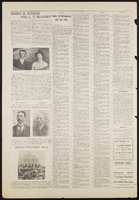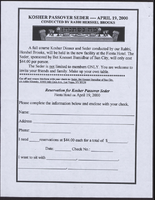Search the Special Collections and Archives Portal
Search Results

Meeting minutes for Consolidated Student Senate University of Nevada, Las Vegas, January 31, 1985
Date
Archival Collection
Description
Text

Yazmin Beltran oral history interview: transcript
Date
Archival Collection
Description
Oral history interview with Yazmin Beltran conducted by Rodrigo Vazquez and Barbara Tabach on February 4, 2019 for the Latinx Voices of Southern Nevada Oral History Project. Beltran discusses her early life in Mexicali, Baja California, Mexico and her childhood and upbringing in Mexico. In 2003, at the age of eighteen, she and her mother joined the rest of her family in Las Vegas, Nevada. After attending College of Southern Nevada and taking English as a Second Language classes, Yazmin began to write as a Spanish contributor for a publication in Reno, and became a writer for Spanish publications in Las Vegas, including El Tiempo, El Mundo, and Univision. Beltran's work for Univision led her to Texas, where she covered events and crises including the 2018 child separation occurring at the United States border, which she discusses in the interview. Finally, Beltran talks about being a journalist for The Nevada Independent and the importance of continuing to report in Spanish.
Text
Las Vegas African American Community Conversations round table interviews
Identifier
Abstract
The Las Vegas African American Community Conversations is a four-part conversation with local Las Vegans. The first part of the round table is moderated by Trisha Geran with a central theme of "Migration, Work and Community Emergence." The panelists discuss the early history of the African American community in Las Vegas, Nevada. They also discuss how and why their families moved to Las Vegas, most citing the economic opportunities as a major factor. The participants share their personal histories and family histories building up the African American community in downtown Las Vegas and the Westside. The second part of the round table is moderated by Sonya Horsford with a central theme of "Education, Economy, and Integration." The panelists discuss the Clark County School District pre- and post-integration. They discuss the hardships of the Sixth Grade Center Integration Plan on the African American community as well as discussing the differences in the school facilities. The round table participants also discuss the social services and social programs and the history of those programs from the African American perspective. They also discuss civic involvement and the various civic groups started by the panelists, and share discrimination they faced.
The third part of the round table is moderated by Claytee D. White with a central theme of "Civil Rights and Entertainment." The panelists discuss the racism and segregation present in Las Vegas and discuss how African American community leaders worked to integrate African Americans into the Las Vegas community. They discuss the 1969 riots in detail, and discuss African American entertainers and the entertainment industry. They share personal experiences working in the entertainment industry and discuss the importance of the local unions, such as the Culinary Workers Union Local 226, the International Alliance of Theatrical Stage Employees Local 720, and their contributions to the unions. The fourth and final part of the round table is moderated by Rachel Anderson with a central theme of the "Early African American Legal Community." The panelists discuss the foundations of the professional legal community in Las Vegas, noting the contributions of Charles Keller, Dr. William Bailey, and the Reverend Marion Bennett as driving forces for civil rights activism in Las Vegas. They share their experiences growing up in Las Vegas facing discrimination and segregation. Lastly, they share the changes they have seen and how both the legal and African African communities have grown.
Archival Collection
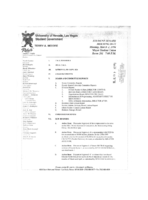
Meeting minutes for Consolidated Student Senate University of Nevada, Las Vegas, March 2, 1998
Date
Archival Collection
Description
Text

Meeting minutes for Consolidated Student Senate University of Nevada, Las Vegas, February 10, 1997
Date
Archival Collection
Description
Text

Meeting minutes for Consolidated Student Senate University of Nevada, Las Vegas, August 26, 1996
Date
Archival Collection
Description
Text
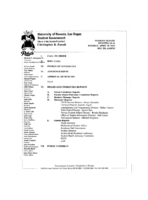
Meeting minutes for Consolidated Student Senate, University of Nevada, Las Vegas, April 28, 2003
Date
Archival Collection
Description
Text
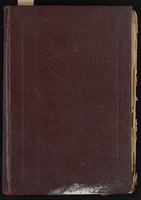
Bluebell Girls: scrapbook of newspaper clippings and photographs
Date
Archival Collection
Description
From the Margaret Kelly Collection on the Bluebell Girls, MS-00604. The scrapbook includes newspaper clippings about the Bluebell Girls, Folies-Bergère, and dancer Catherine Dunne's experiences in Milan, Italy at the start of World War II.
Mixed Content

